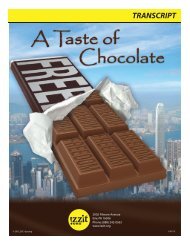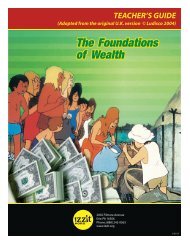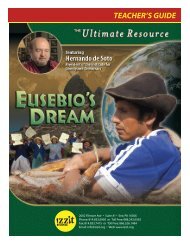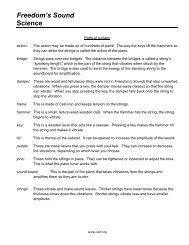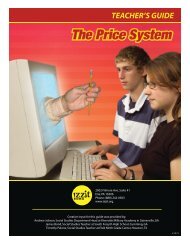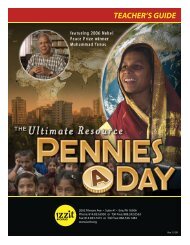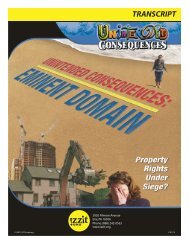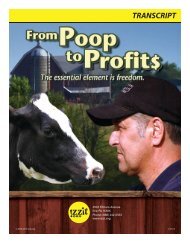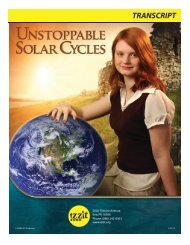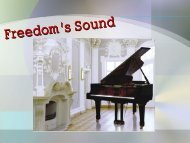You also want an ePaper? Increase the reach of your titles
YUMPU automatically turns print PDFs into web optimized ePapers that Google loves.
TRANSCRIPT<br />
2002 Filmore Avenue<br />
Erie, PA 16506<br />
Phone: (888) 242-0563<br />
www.izzit.<strong>org</strong><br />
© 2007, 2013 izzit.<strong>org</strong><br />
V.01/13
Freedom’s Sound<br />
<strong>Transcript</strong><br />
For a list of additional resources to use with this video go to<br />
www.izzit.<strong>org</strong>/products and click on the Freedom’s Sound video.<br />
NARRATOR: From small villages in sub-Saharan Africa to the bustling cities of the Asian subcontinent,<br />
from Latin American to China and Eastern Europe people everywhere are striving to improve<br />
their lives. People seeking the same things: opportunity to learn, an identity and ownership that allows<br />
them to prosper, a chance to earn a living for themselves and their families, to use their imaginations, to<br />
take risks and possibly fail but to increase their options and reap the rewards if they succeed. Join us now<br />
to see what can happen when ordinary people have the tools to help themselves.<br />
Somewhere on earth, at this very moment, a child is beginning its journey through life. Two hundred and<br />
fifty babies are born every minute; fifteen-thousand an hour; 132 million a year, each and every year.<br />
And among them may be the potential to cure disease, to reinvent the future, or to change the course of<br />
world history because people are the world’s ultimate resource.<br />
Sometimes miracles occur in the most unlikely places. This small country has been dominated by its<br />
neighbors and denied freedom for most of its history. In the center of its capital, Tallinn, remains one of<br />
the best-preserved medieval cities in Northern Europe - a testament to what can be created through free<br />
trade. Since its independence from the Soviet Union in 1991 sweeping economic reforms have<br />
transformed Estonia. It’s now the most competitive new member of the European Union and the Wall<br />
Street Journal ranks it as one of the freest economies in the world. Johan Norberg is a Swedish author<br />
and scholar specializing in global trade issues.<br />
JOHAN NORBERG: Just fifteen years ago, this was a poor part of the Soviet communist dictatorship.<br />
There were bread lines, one thousand percent inflation - but then with the right institutions, democracy,<br />
free trade, free markets - suddenly people had the opportunity to improve their lives with entrepreneurial<br />
creativity. And now this place is booming with the fastest growth rates in Europe. So it shows the rest of<br />
the world that freedom works.<br />
NARRATOR: In an older neighborhood on the outskirts of Tallinn is the home of one of Estonia’s most<br />
dramatic success stories. The Estonia Piano Company is now producing an instrument that rivals the<br />
finest pianos on the market.<br />
JOHAN NORBERG: People everywhere are entrepreneurs. They want to produce, buy and sell things<br />
because they want to improve their lives for themselves and for their families. Estonians have always<br />
done that. They were creative, entrepreneurial up until the Communist occupation.<br />
NARRATOR: For fifty years Estonia was ruled by the Soviet Union, its economy stifled by the central<br />
control of production and distribution. Although Estonians won their independence from Russia after the<br />
First World War, they lost it again to the Soviets during the Second. In those bleak times, the Estonia<br />
Piano Company manufactured instruments only for the Soviet Republics. Like most young Estonian men,<br />
Urmass Orunurm was drafted into the Soviet Army. Today he’s a master craftsman, but still remembers<br />
the hardships of his youth.<br />
1
URMASS ORUNURM: Everything was completely different during the Soviet times. Just to buy an<br />
orange you had to know someone, get it through a back door.<br />
NARRATOR: Jaanus Randveer is also a master piano craftsman. He has worked at the Estonia Piano<br />
Company for 45 years. He will never f<strong>org</strong>et the Soviet era.<br />
JAANUS RANDVEER: In those days all the alert, active people like my father were taken away. They<br />
were simply taken away. He worked twelve or thirteen years in forestry and the mines in Siberia. I was<br />
in the 8 th grade when I really first saw my father.<br />
JOHAN NORBERG: For a company here in Estonia before the reforms, they were stuck in a planned<br />
economy. It was impossible for them to get the kind of goods, the supplies that they needed. With the<br />
abolishment of price controls, of protectionism, of Communism, suddenly this entrepreneurial spirit<br />
springs up and creates magical wonders.<br />
NARRATOR: But even with Estonia’s new independence and the eventual success of painful economic<br />
reforms, the Estonia Piano Company and its craftsmen remained trapped in the past. For forty years they<br />
had built pianos exclusively for the state. Standards were low but it was a steady business. They were<br />
forced to buy most of their materials from within the Soviet Union and they could only sell pianos within<br />
the Soviet Union. There was no competition, no incentive.<br />
JAANUS RANDVEER: For a while we were really at the bottom. We made old pianos. We wanted to<br />
keep people working, but the Soviet market suddenly disappeared.<br />
NARRATOR: The instruments were sturdy, but hardly world-class. Production dropped from five<br />
hundred pianos a year to a low of forty-nine in 1994. The National Concert hall in Tallinn - Urmass is<br />
here with his daughter, Triin. He’s on assignment. Indrek Laul, concert pianist and graduate of the<br />
Julliard School of Music, is practicing for a performance. He’s playing a new Estonia Piano, and Urmass<br />
is here to ensure it is in perfect condition. But Indrek Laul is not just any concert pianist. As a young<br />
man in Estonia, he worked at the piano factory demonstrating new instruments for customers. As the<br />
company continued to struggle and the value of its shares continued to drop, Indrek bought as much stock<br />
as he could. In 2003, he gained controlling interest in the troubled company. He’s now its president.<br />
When he took over his daunting task was to keep the company alive. His answer was “quality.”<br />
INDREK LAUL: Piano is bought once in a lifetime, and so they want to get the most beautiful piano<br />
sound, the most beautiful quality piano they can get. I thought that the best we can do is offer the most<br />
quality instrument that we can make.<br />
JOHAN NORBERG: Centrally planned economies don’t work because you can only get people to do<br />
the same old thing, to repeat what they’ve already done, the same old piano, for example. What you need<br />
is the new entrepreneurs, the innovators with strange new ideas who come in from the side, like this guy<br />
who comes with a brilliant idea for a new piano, introduces hundreds of changes, and then suddenly is<br />
going global selling all over the world.<br />
NARRATOR: Today, the Estonia Piano Company benefits from the finest quality imports and<br />
techniques from around the world. Wood for the soundboard comes from the cold climates of<br />
Switzerland and Austria. Slow growing trees make narrow rings that help carry the sound. Keys are<br />
carved from spruce, making them light and sensitive. The keys are the driving force of the piano action,<br />
which is imported from Germany. All the base strings are handmade at the factory. Copper wire adds<br />
2
width, which lowers the tone. Master craftsmen shape and soften the hammers until the sound is rich and<br />
concentrated. Every piano is broken in by this unique machine. The strings are stretched. It is then sent<br />
for tuning and voicing.<br />
JOHAN NORBERG: Now in a new, free Estonia, having abolished all the tariffs and become a part of<br />
the global economy, it’s possible for an Estonian Piano Company, for example, to buy the best goods, the<br />
best supplies, the best material from whichever source it happens to be wherever in the world. Then they<br />
can also improve their goods and sell it to the rest of the world.<br />
INDREK LAUL: We still have 88 keys, and the amount of strings we have on the piano is the same.<br />
Everything else has been changed. It’s a completely different instrument from what it was.<br />
NARRATOR: To help save the company, Indrek enlisted the help of his father, Venno Laul. An<br />
internationally known choir director, Venno works along side the craftsmen, supervising the many<br />
changes and ensuring quality. During World War II, he was only five years old when the Germans<br />
imprisoned his father and executed him.<br />
VENNO LAUL: When we became free it was such a great change to our whole nation that at first we<br />
didn’t understand what the age of oppression had meant. As the world opens up to us we have products<br />
to send to larger nations.<br />
NARRATOR: Estonia Pianos are now sold worldwide, and rank close to Steinway in quality at about<br />
half the price.<br />
JOHAN NORBERG: We can clearly see that a great benefit of free trade is cheaper goods, which means<br />
the consumers they gain from it, but we often f<strong>org</strong>et that the workers also gain so much.<br />
URMASS ORUNURM: Estonia Pianos are good because they’re handcrafted. They’re good because I<br />
make this piano. If no one buys the piano, then my life does not go so well either. It’s good that Estonia<br />
Piano sells pianos all over the world. Then pay day is a good day.<br />
INDREK LAUL: We have created the Estonia sound. It’s like no other piano sound you can find. It has<br />
that deep, romantic, rich tone that for me represents not only Estonia piano making, but also Estonia<br />
musical culture. I don’t think without free trade our company would even exist right now.<br />
VENNO LAUL: “I would say to all the nations who have not yet achieved freedom and free markets,<br />
that it is an aim and an ideal in whose name no price is too large. The promise of this dream has been a<br />
reason to live.<br />
For a list of additional resources to use with this video go to<br />
www.izzit.<strong>org</strong>/products and click on the Freedom’s Sound video.<br />
3
We are very interested to learn<br />
how you use our material. Please<br />
share your experiences or lesson<br />
plan ideas by visiting us<br />
at www.izzit.<strong>org</strong>.<br />
2002 Filmore Avenue<br />
Erie, PA 16506<br />
Phone: (888) 242-0563<br />
www.izzit.<strong>org</strong>



